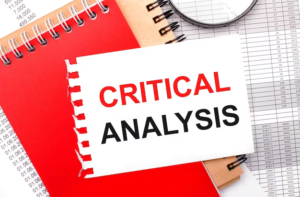Critical analysis essay writing is an important skill for students and academics. It involves a careful examination and evaluation of a piece of work, such as a book, article, or film, in order to provide a critical analysis of its strengths and weaknesses. However, there are several common mistakes that students make when undertaking critical analysis essay writing.
We’ll delve deeper into the top 10 critical analysis essay writing mistakes to avoid, so that you can produce a high-quality analysis that effectively evaluates and critiques the work you’re examining.

-
Not understanding the Critical Analysis Essay requirements
One of the most common mistakes students make when starting a critical analysis essay is failing to fully understand the assignment requirements. This can include not following the proper formatting guidelines or not adhering to the word count limit. Understanding the assignment requirements is critical in producing a well-written analysis. For example, if the assignment requires a 1000-word analysis and the student produces a 1500-word analysis, the professor may deduct points for not following the guidelines.
-
Failing to read and analyze the work thoroughly
Another common mistake is failing to read and analyze the work thoroughly. For example, if a student is analyzing a book and only reads a few chapters, they may miss important details that are critical to their analysis. This can result in a shallow or incomplete analysis, which may not meet the professor’s expectations.
-
Overgeneralizing or oversimplifying your analysis
Overgeneralizing or oversimplifying an analysis is another mistake that students often make. For example, if a student is analyzing a film and simply states that it is “good” or “bad” without providing specific examples to support their claim, the analysis may not be considered credible. It’s important to provide specific evidence and examples to support your analysis and avoid making broad statements that lack substance.
-
Neglecting to consider the context
The context in which a work was created can greatly impact its meaning and significance. For example, a work created during a time of political turmoil may have a different meaning than a work created during a time of peace. It’s important to consider the historical, cultural, and social context of the work you’re analyzing, as this can provide important insights into its meaning. Neglecting to do so can result in a shallow or incomplete analysis that fails to fully examine the work.
Read on How to Revise Your Critical Analysis Writing for Better Grades
-
Failing to engage with opposing viewpoints
Critical analysis essay writing requires you to consider multiple perspectives and viewpoints. It’s important to engage with opposing viewpoints and consider alternative interpretations of the work. Failing to do so can weaken your analysis and make it appear one-sided. For example, if a student is analyzing a political essay and only presents arguments from one political perspective, they may fail to fully analyze the work from multiple angles.
-
Not providing enough evidence to support your claims
Your analysis should be supported by evidence from the work you’re analyzing. Make sure to provide specific examples and quotes to support your claims. By doing so, you demonstrate a deeper understanding of the work and provide a more convincing analysis. For example, if a student is analyzing a poem and fails to provide specific examples from the text to support their claims, their analysis may be considered weak or lacking substance.
-
Using vague or unclear language
In order to effectively communicate your ideas, it’s important to use clear and precise language. Avoid using vague or unclear language in your analysis, as this can make your analysis difficult to understand and weaken your arguments. For example, using words like “good” or “bad” without explaining why can make an analysis seem unprofessional or lacking in depth.
-
Neglecting to proofread and edit your work
Critical analysis essay writing requires careful attention to detail. It’s important to proofread and edit your work carefully to avoid spelling and grammar errors. These errors can distract from your analysis and make it appear unprofessional. Make sure to read through your analysis multiple times, and consider having a friend or colleague read it over as well to catch any mistakes you may have missed.









 Evan John
Evan John